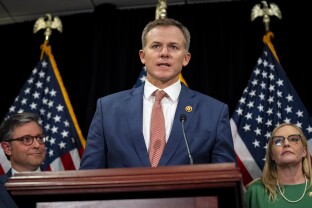The 119th Congress, so far, hasn’t provided many opportunities for the Problem Solvers Caucus to solve problems.
It’s not that the problem solvers don’t want to solve problems — or that there aren’t problems to solve. It’s that the style of substantive, bipartisan collaboration they’re trying to promote is nearly impossible while Republicans are advancing a partisan reconciliation package. And those partisan maneuvers can make things tense.
“Reconciliation is an inherently partisan process,” one Republican member of the caucus told NOTUS, requesting anonymity to be candid about group dynamics.
“So there will be a bit of a hangover,” this member said. “But because this is the fourth reconciliation in relatively short order, I think people kind of account for the fact that it’s a bump in the road, from a bipartisan perspective, but there’s still a lot of really important stuff we have to do together.”
Outside observers might be excused for seeing the reconciliation bill as more than a bump in the road for bipartisanship. GOP lawmakers are using budget reconciliation, with rules allowing a lower threshold for passage in the Senate, as a way to completely sidestep negotiation with Democrats. And Republicans are planning sweeping cuts to social safety net programs to offset tax cuts, with Democrats up in arms about the plan.
But problem solvers say this situation won’t necessarily drive a wedge between the caucus any more than other partisan bills have in recent years.
Its members descended into infighting and turmoil during the last Congress, after Democrats voted with former Rep. Matt Gaetz and several other Republicans to oust then-House Speaker Kevin McCarthy. Republicans in the group accused those Democrats of not truly valuing bipartisanship, if they were willing to help Gaetz’s gambit succeed and throw the House into chaos.
Democrats, meanwhile, justified the move by pointing to McCarthy’s political rehabilitation of President Donald Trump shortly after Trump’s supporters overran the Capitol complex in January 2021, in an attempt to keep him in power after he lost the 2020 election.
But members say that things have gotten better since the last Congress.
Rep. Tom Suozzi, the Democratic co-chair of the group, told NOTUS in a statement that he has seen “a renewed energy of bipartisan spirit in this Congress, particularly around critical issues like immigration and permitting reform.”
“Members from both parties are collaborating in good faith to advance practical solutions, even amidst a challenging legislative environment,” he said. “The energy is palpable.”
And the Republican who spoke anonymously told NOTUS that the group’s dynamics are “much improved” since last year.
“Getting through the November election kind of hit a reset button,” the GOP lawmaker said. “People are coming back to the table. There are really meaningful conversations going on. The level of trust is not quite where it was — we’re still rebuilding some of that — but we’re absolutely headed in the right direction.”
“It’s like any big blowup a married couple has,” they added. “You can either decide to break up or make it work, and I think for the sake of the kids, it’s pretty important we make it work.”
Members of the caucus met in Florida earlier this year for a relationship-building retreat, where they discussed legislative ideas. Lori Chavez-DeRemer, an Oregon Republican, got the call asking her to be labor secretary while she was there, Rep. Greg Landsman of Ohio remembered.
“She’s a pro-union Republican,” he said. “It’s great.”
Landsman, a Democrat, is vehemently opposed to the GOP’s reconciliation package, and he hopes Republicans within the Problem Solvers Caucus ultimately vote against it.
“They don’t want to do this,” he said in an interview Monday. “I believe they were given an assignment from Trump and congressional Republican leadership, and this assignment sucks. They don’t like it.”
“I’m working and hopeful that we can kill this bill,” he said.
Landsman told NOTUS he would be frustrated if every House Republican ultimately supported the legislation. But, “then you get back to work.”
He said he doesn’t get much pushback from Democratic constituents about working with Republicans during the Trump era.
“What we’re seeing is absolutely atrocious — pure chaos, blatant corruption, a level of cruelty I’ve never seen in American politics,” Landsman said. “You also serve 800,000 people who, when you get an opportunity, expect you to get things done, to make things happen. And all of those things work together. They’re not in conflict.”
Other members of the group likewise expressed optimism for bipartisan collaboration, even if the more ambitious work won’t happen for a few months.
“We’re working on a reconciliation package, so there’s not a lot of, you know, bipartisan collaboration on this bill,” Rep. Blake Moore, a Utah Republican, told NOTUS. “There’s not a ton of activity, but still good relationships and still people meeting and stuff.”
Moore paused in the middle of chatting about the group outside the House chamber to greet Illinois Rep. Brad Schneider, a Democratic member of the caucus.
“We are continuing to have conversations,” Schneider said. He pointed out that he and Moore had just spent 27 hours together in a committee markup.
“I slept through some of it,” Moore noted.
“There’s going to be a lot of work to do with the appropriations bill,” Moore said. “We’ve got health care policy that we typically line up on. There’s going to be lots to do after the reconciliation.”
—
Haley Byrd Wilt is a reporter at NOTUS.
Sign in
Log into your free account with your email. Don’t have one?
Check your email for a one-time code.
We sent a 4-digit code to . Enter the pin to confirm your account.
New code will be available in 1:00
Let’s try this again.
We encountered an error with the passcode sent to . Please reenter your email.


